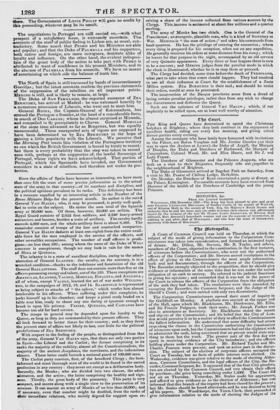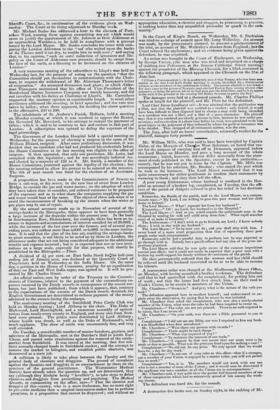e liffetrapotift.
A Court of Common Council was held on Thursday, at which the subject of the mode of giving information to the Corporation Com- missioners was taken into consideration, and formed an animated topic of debate. Mr. Dillon, Mr. Stevens, Mr. R. Taylor, and others, members of the Court, objected to the examination, in the first instance, of witnesses before the Commissioners, who were not the authorized officers of the Corporation ; and Mr. Stevens moved resolutions to the effect of giving to the Commissioners the most ample information, both oral and documentary, through the officers of the Corporation. The Recorder strongly objected to the proposition, that he should give evidence or information at the same time that be was under the sacred obligation of an oath to secrecy, He referred to his judicial functions in giving his opinions ; and contended that it was not in the power of the Court to release the officers of the Corporation from the obligation of the oath they had taken. The resolutions were then amended, by excepting the Recorder, the Common Sergeant, and the Judge of the Sheriff's Court ; and were carried with only two dissentients.
The Corporation Commissioners opened their court of inquiry in the Guildhall on Monday. A platform was erected at the upper end of the Hall, upon which Mr. Blackburne, Mr. Drinkwater, Mr. Ellis, and Sir Francis Palgrave, took their seats • Mr. Joseph Parkes was also in attendance as Secretary. Mr. Blackburne stated the nature and objects of the Commission ; and his belief that the City of Lon- don would perceive it to be a matter of duty to afford the Commissioners the fullest information. He understood that some difficulty had arisen respecting the clause in the Commission authorizing the examination of witnesses upon oath, but the Commissioners had not the slightest wish to administer the oath, being convinced that no person would state any- thing to them but the truth. The greater part of the first day was spent in receiving evidence of the City boundaries ; and the officers bolding places under the Corporation. Mr. Richard Taylor and Mr.. Charles Pearson were present, and took an active part in the discus- sion. The subject of the election of corporate officers occupied the Court on Tuesday, but no facts of public interest were elicited. On Wednesday, evidence was given relative to the mode of electing Alder- men, Common Councilmen, and the legal officers of the City, the Re- corder, Common Sergeant, &c. It appeared that of the four City pleaders, two are elected by the Common Council, and two obtain their offices by purchase—the price being something under 1,500/. The Court did not sit on Thursday. Yesterday, Mr. Scales made his appearance, and offered to give evidence as to the election of Aldermen ; but was informed that this branch of the inquiry had been closed for the present ; but Mr. Scales should be heard afterwards, and he was desired to bring all his papers. Mr. Woodthorpe, the. Town-Clerk, then proceeded to give information relative to the mode of electing the Judges of the
Sheriff's Court, &c., in continuation of the evidence given on Wed- nesday. • The Court at its rising adjourned to Monday week.
Mr. Michael Scales has addressed a leter to the electors of Port- soken Ward, warning them against committing any act mhich would seem to justify the appointment of Mr. Johnson as their Alderman at an approaching Wardmoce, to be held in compliance with a precept issued by the Lord Mayor. Mr. Scales concludes his letter with com- paring the London Aldermen to the "oaf who waited upon the banks of the Thames until it ran dry, to enable him to walk over ;" and saying ' that, in his opinion, "such an outré collection of ignorance and ille- gality as the Court of Aldermen now presents, should be swept from the face of the earth, as a blessing to be bestowed on the citizens of London."
A very numerous meeting of the subscribers to Lloyd's was held on Wednesday last, for the purpose of voting on the question "that the Committee should put themselves in communication with the Chair- man, to request the withdrawal of Mr. Alderman Thompson's letter of resignation." An animated discussion took place ; in which Alder- man Thompson maintained that his office of Vice-President of the Sunderland Marine Insurance Company was merely honorary, and did not interfere with his duties as Chairman at Lloyd's. Mr, Carruthers supported the contrary opinion at considerable length. Several other gentlemen addressed the meeting, in brief speeches ; and the vote was taken by ballot ; when there appeared, for deciding the above question in the affirmative, 245 to 240.
The inhabitants of St. Andrew's Parish, Holborn, held a meeting on Monday evening, at which it was resolved to oppose the Rector, the Reverend Mr. Beresford, in his attempt to compel the payment of tithes ; which is said to be contrary to law and custom in that part of London. A subscription was opened to defray the expenses of the legal proceedings.
The Governors of the London Hospital held a special meeting on Wednesday, for the purpose of electing a surgeon in the room of Sir William Blizard, resigned. After some preliminary discussion, it was decided that no candidate who had not produced his credentials before the House Committee at its last meeting was eligible to the office of surgeon. It then appeared, that only one gentleman, Mr. Luke, had complied with this regulation ; and he was accordingly balloted for, and elected by a majority of 123 to 8. Mr. Smith, a member of the House Committee, protested against the legality of the election ; but the meeting refused to allow his protest to be entered on the minutes. The 8th of next month was fixed for the election of an Assistant- Surgeon.
A proposition has been made to the Commissioners of Sewers to form a sub-way, or dry sewer, in the new line of street from London Bridge, to contain the gas and water mains ; on the adoption of which they have taken time to consider, and ordered estimates to be prepared of the expenses and as to what share the companies supplying the gas and water would bear of the same. The object of these sub-ways is to avoid the inconvenience of breaking up the streets when the water or gas pipes may be out of repair.
• By the annual accounts made up in November of several of the savings-banks in the Metropolis, there appears to have been generally a large increase of the deposits within the present year. In the bank in Southampton Row, Bloomsbury, for example, there has been an in- crease in deposits and accumulations of interest uncalled for of 29,000/. ; while the increase of the last year over the former, and of several pre- ceding years, was seldom more than 5,0001. or 6,000/. in the same institu- tion. It is said that the plan of the late act, enabling the savings-hanks to grant annuities, is not likely to be acted on by those in London, the allowance under that act not being considered adequate to the additional trouble and expense incurred ; but it is expected that one or two insti- tutions on a large scale, expressly for that purpose, will shortly be established in the Metropolis.— Times.
A dividend of 5* per cent. on East India Stock forthe half-year ending 5th of January next, was declared at the Quarterly Court of Proprietors held on Wednesday at the India House. On the same day, a petition to the House of Commons, praying for an equalization of duty on East and West India sugar, was agreed to. It will be pre- sented by Mr. Charles Grant.
An official notice, sent by order of the Treasury to the Commis- sioners of Customs, relative to the payment of the extraordinary ex- penses incurred by the Dutch vessels in consequence of the recent em- bargo, has just been published ; from which it appears, that, contrary to the expectations of the owners of the Dutch vessels detained, the English Government are determined to enforce payment of the money advanced to the owners during the embargo.
The anniversary meeting of the Smithfield Prize Cattle Club was held on Monday evening; Lord Althorp in the chair. The Duke of Richmond, Lord Huntingfield, and a numerous assembly of agricul- turists from nearly every county in England, and many also from Scot- land were present. The prizes were distributed by Lord Althorp ; whose health was drunk, as well as the Duke of Richmond's, with much applause. The show of cattle was uncommonly fine, and very well attended.
On Tuesday, a considerable number of master butchers, graziers, and salesmen of the Metropolis, met at the Butcher's Hall in Little East Cheap, and passed some resolutions against the removal of the cattle- market from Smithfield. It was stated at the meeting, that five mil- lions annually changed hands in Smithfield market; and the attempt to remove the market to Islington, and establish public abattoirs, was denounced as a mere job.
A collision is likely to take place between the Faculty and the general body, of chemists and druggists. The ground of complaint against the chemists and druggists is an encroachment by them on the province of the general practitioner. The Westminster Medical Society have already taken the question up, and are determined, they say (although they .disclaim being " levellers"), to take steps to debar chemists and druggists from prescribing and practising. The Medical Gazette, in commenting on the affair, says—" That the chemist and druggist of this country, who is a mere tradesman, has no more right to prescribe medicine than a surgical instrument-maker has to perform Aerations, is a proposition that cannot be disproved ; and without an appropriate education, a chemist and druggist, in presuming to practice, is nothing better than any unqualified pretender or quack in the tens- munity.'



















 Previous page
Previous page